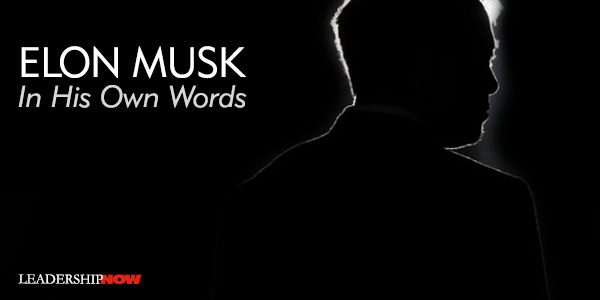 |
 |
09.10.21

Elon Musk: In His Own Words
ELON MUSK is a polarizing figure. In part, because he thinks differently than most people. At a 2017 World Government Summit, he once told an audience, “Some people think I’m an alien.” His raw ideas may sound irrational, but in time they seem obvious — even to his critics. Editor Jessica Easto has compiled his thoughts in Elon Musk: In His Own Words. Easto has organized the book into three parts: Getting Started, Growth, and Wit, Wisdom, and Personal Values. Here are several: ☙ I think I would make far fewer mistakes [if I were to go back in time and talk to my 20-year-old self], like, “Here’s a list of all the dumb things you’re about to do. Please do not do them.” It’d be a very long list. ☙ Do you have the right axioms, are they relevant, and are you making the right conclusions based on those axioms? That’s the essence of critical thinking, and yet it is amazing how often people fail to do that. I think wishful thinking is innate in the human brain. You want things to be the way you wish them to be, and so you tend to filter information that you shouldn’t filter. ☙ I do think a good framework for thinking is physics, you know, the first principles reasoning. What I mean by that is boil things down to their fundamental truths and reason up from there as opposed to reasoning by analogy. Through most of our life, we get through life by reasoning by analogy, which essentially means kind of copying what other people do with slight variations. And you have to do that, otherwise mentally you wouldn’t be able to get through the day. But when you want to do something new, you have to apply the physics approach. Physics has really figured out how to discover new things that are counterintuitive, like quantum mechanics; it’s really counterintuitive. ☙ A lot of times people think creating companies is going to be fun. I would say it’s not. It’s really not that fun. There are periods of fun, and there are periods where it’s just awful. Particularly if you’re the CEO of the company, you actually have a distillation of all the worst problems in the company. There’s no point in spending your time on things that are going right, so you only spend your time on things that are going wrong.... I think you have to feel quite compelled to do it and have a fairly high pain threshold. ☙ It’s better to approach this [building a company] from the standpoint of saying—rather than you want to be an entrepreneur or you want to make money—what are some useful things that you do that you wish existed in the world? ☙ Fundamentally, if you don’t have a compelling product at a compelling price, you don’t have a great company. ☙ Things move as fast as the least lucky and least competent supplier. Any natural disaster you care to name—all of those things have happened to our suppliers. The factory has burned down, there’s been an earthquake, there’s been a tsunami, there’s been massive hail, there’s been a tornado, the ship sank, there was a shoot-out at the Mexican border—no kidding. That delayed trunk carpet. ☙ If we don’t succeed, then we will be certainly pointed to as a reason why people shouldn’t even try for these things. So I think it’s important that we do whatever is necessary to keep going. ☙ Always take the position that you are, to some degree, wrong, and your goal is to be less wrong over time. ☙ You should actually take the approach that the constraints that you are given are guaranteed to be some degree wrong.… The counterpoint would be that they're perfect [which is never].... Question your constraints. It does not matter if the person handing you those constraints won a Nobel Prize—even Einstein was wrong some of the time. ☙ I have no problem with negative feedback, nor do I have a problem with critical reviews. If I had a problem with critical reviews, I would spend all my time battling critical reviews. There have been hundreds of negative articles—hundreds—and yet I’ve only spoken out a few times. I don’t have a problem with critical reviews, I have a problem with false reviews. ☙ The first step is to establish that something is possible; then probability will occur. ☙ As you get older, your obligations increase. And once you have a family, you start taking risks not just for yourself but for your family as well. It gets much harder to do things that might not work out. So now is the time to do that—before you have those obligations. I would encourage you to take risks now; do something bold. You won’t regret it. ☙ I just want to emphasize that sometimes—in fact, most of the time—I get way too much credit or attention for what I do. I’m just the visible element. But the reason those companies are successful is because we have extremely talented people at all levels that are making it happen. ☙ Honestly, I really am just trying to do the most amount of good with the time that I have on this earth. And, you know, not always succeeding, but that’s the goal. ☙ Really should be a rule that oatmeal-raisin cookies can’t look too much like choc chip. Doppelgänger cookie trickery! 
Posted by Michael McKinney at 10:47 AM
|
BUILD YOUR KNOWLEDGE
 

How to Do Your Start-Up Right STRAIGHT TALK FOR START-UPS 
Grow Your Leadership Skills NEW AND UPCOMING LEADERSHIP BOOKS 
Leadership Minute BITE-SIZE CONCEPTS YOU CAN CHEW ON 
Classic Leadership Books BOOKS TO READ BEFORE YOU LEAD |